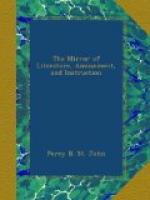About two years after his marriage, the Count de Witt obtained leave of absence, and, accompanied by his wife, he visited the different courts of Europe. Sophia’s beauty, which derived piquancy from a certain Oriental languishment of manner, was every where the theme of admiration. The Prince de Ligne, who saw her at the Court of France, mentions her in his Memoirs, in terms of eulogy, which I cannot think exaggerated; for when I knew her at Tulczin, though she was then upwards of forty, her charms retained all their lustre, and she outshone the young beauties of the court, amidst whom she appeared like Calypso surrounded by her nymphs.
I now arrive at the second period of Sophia’s life, which forms a sequel perfectly in unison with the commencement. Count Felix Patocka, at the commencement of the troubles in Poland, raised a considerable party by the influence of his rank and vast fortune. During a temporary absence from the Court of Poland, he made a tour through Italy, and on his return, he met the Count and Countess de Witt at Hamburgh, when he fell deeply in love with Sophia. Not to weary you with the details of the romance, I will come to the denouement at once.
Nothing is so easy as to obtain a divorce in Poland. The law extends so far on this point, that I knew a gentleman, M. Wortrel, who had no less than four wives, all living, and bearing his name. Count Patocka, therefore, availing himself of this advantage, and having previously made every necessary arrangement, one morning called on Count de Witt, and, without further ceremony, said—“Count, I love your wife, and cannot live without her. I know that I am not indifferent to her; and I might immediately carry her off; but I wish to owe my happiness to you, and to retain for ever a grateful sense of your generosity. Here are two papers: one is an act of divorce, which only wants your signature, for you see the Countess has already affixed hers to it;—the other is a bond for two millions of florins, payable at my banker’s, in this city. We may, therefore, settle the business amicably or otherwise, just as you please.” The husband doubtless thought of his adventure at the fortress of Kaminieck, and, like the French ambassador, he resigned himself to his fate, and signed the paper. The fair Sophia became, the same day, Countess Patocka; and to the charms of beauty and talent, were now added the attractions of a fortune, the extent of which was at that time unequalled in Europe.—Court Journal.
* * * * *
Retrospective Gleanings.
* * * *




